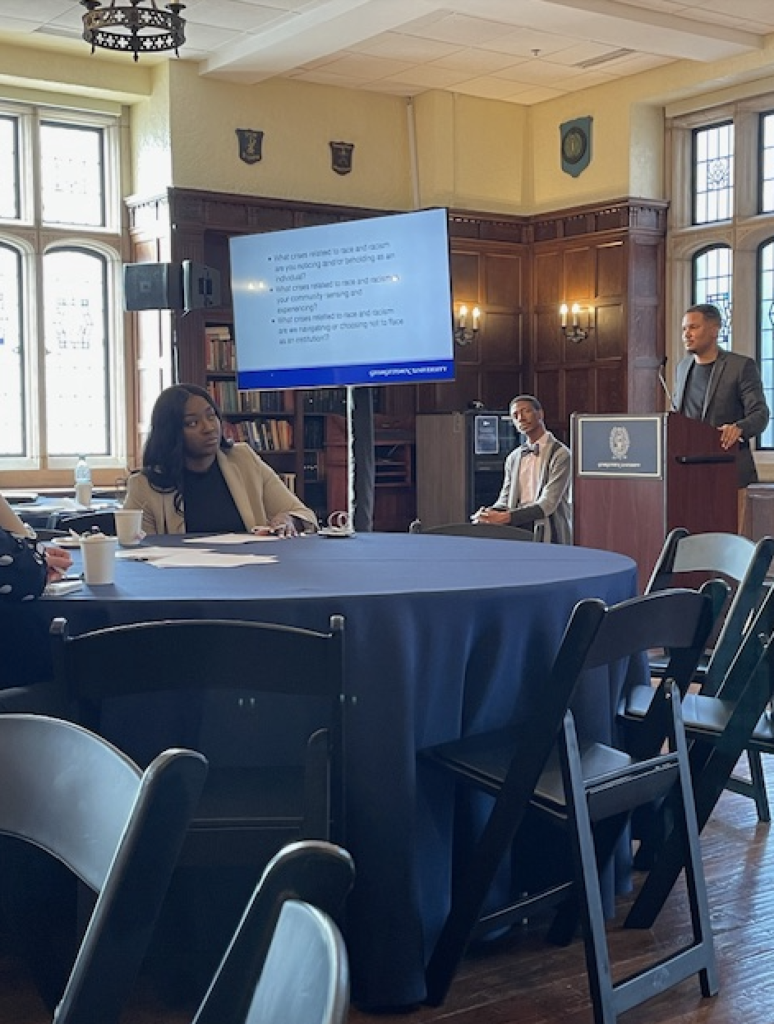
Every year, Mission in Motion reflects on Georgetown’s chosen speech of Dr. Martin Luther King, Jr. and offers some suggestions for how its content and themes might be incorporated into courses and other activities at SCS. The 2024 Teach the Speech selection, “Eulogy for the Four Little Girls,” is Dr. King’s memorialization of the four young girls killed in the 1963 terrorist bombing of the 16th Street Baptist Church in Birmingham, Alabama.
In his eulogy, Dr. King mournfully prays for the souls of Addie Mae Collins, Carol Denise McNair, Cynthia Diane Wesley, and Carole Robertson. The speech is more than a remembrance of these lives, however. Dr. King draws attention to the larger moral and spiritual questions presented by such an act of racialized violence. How can we exercise non-violence and a spirit of non-retaliation in the face of such hate and destruction? Dr. King maintains that we “must believe that the most misguided among them can learn to respect the dignity and the worth of all human personality.” Speaking to bereaved families in the aftermath of such tragedy, Dr. King, who would ultimately be killed in an act of racialized violence, inspires a call to redemption. This road is not easy, however, and requires resistance to “evil systems” and overcoming a tendency to remain silent and complicit in the face of such injustices.
This year’s event includes a helpful set of teaching resources that can accompany the 1963 speech. This resource document traces several approaches that faculty in any discipline might consider in making the content of the speech align with particular course learning objectives. The resource guide suggests some critical questions for individual and group discussion, including:
- King addresses the families of the victims and talks about death as the ‘irreducible common denominator of man.’ He speaks on the importance of faith in these moments. How do we deal with grief and the sense of loss after death? What are the practices in your culture, in your personal lives?
- Have I consciously or unconsciously acted to advance racism through my own inactions or silence? Am I culpable? Have I turned a blind eye to racial injustice? How? Why?
- How will we hold ourselves accountable to one another on the moral imperative of anti-racism?
I was particularly interested in the suggestion that Dr. King’s “Eulogy for the Four Little Girls” could become the basis for an anti-racist self-reflection. Readers of this blog will recognize the Jesuit-inspired examen practice and will know that this framework can be flexibly utilized for particular issues, topics, situations, and events. For example, Mission in Motion has previously reflected on an anti-racist examen published by the Association of Jesuit Colleges & Universities. I was so grateful to attend the guided examen led by Lionell Daggs III, Associate Director for Racial Justice Initiatives at the Center for Social Justice Research, Teaching & Service, and Tony Mazurkiewicz, chaplain for the Athletics Department. Lionell and Tony modeled the examen practice in a dynamic way, using the audio of Dr. King’s eulogy, historical images, a recorded conversation with a survivor of the Birmingham bombing, and other media to stimulate deeper reflection. Between these visuals, groups at tables in Copley Hall were invited to individually reflect on guided questions in silence and then turn to their table partners for brief conversation.
I was moved greatly by the sacred atmosphere of this examen and how table partners, many of whom entered the event as Georgetown strangers, developed a trusting bond formed over intimate reflection and active listening. True to Ignatian pedagogy, the examen experience focused not only on reflection but also consideration of discerned actions that can be taken individually and collectively about the ongoing struggle for racial justice in our university, our communities, our country, and the world. My impression is that participants left the morning session more grounded in Dr. King’s moral and spiritual invitation to human dignity and freedom. This struggle and the journey continue.
